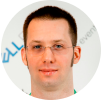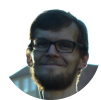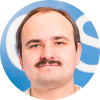Linux Piter # 3: what about this time?
This week ends with the formation of the program of the third international conference Linux Piter , held with the support of Dell EMC.
These are two full days, November 3 and 4, Friday and Saturday in St. Petersburg, filled not with any husk, but with full-fledged reports about the network, system resources, containers and interiors of the Linux kernel. A purely technical subject matter is of interest to all those who use open source products and top technologies around Linux every day in their work and in their projects.

')
In short, we have 3 reports about the grid, 5 about containers, 4 about the core, a couple about performance and many more. So that the level of performances is clear: among the speakers from the States, Germany, Sweden, Austria and of course Russia, Lennart Poettering (systemd manntaineer) and Christoph Hellwig (XFS mantoiner and NVM Express driver) will come to us - this is really cool. There will be reports of engineers working in Redhat, Intel, Microsoft (!), Ericsson, Docker and Canonical. There will be two parallel streams from ten in the morning until the evening: the language of the speeches of the first stream is English (with simultaneous translation into Russian for those who don’t have time), the second one is Russian (with synchronous into English for our foreign guests).
Below are a few announcements of speeches in different sections of the conference.
A nice feature of Linux Piter # 3 is that at the same time on the same site another one of our technical conferences will be held - Piter Py # 4 , and participants will be able to attend reports of either of these two conferences freely.
So, “what is the Linux Piter conference about this time?”
 Christoph Hellwig, Austria, Innsbruck, self employed
Christoph Hellwig, Austria, Innsbruck, self employed
Failure-Atomic file updates for Linux
Discussion of the new atomic update mechanism for crash-resistant XFS files. Its implementation would avoid proprietary implementations of mechanisms that ensure data integrity, for example, for databases.
It should be noted that Christoph is an independent consultant since the beginning of the two thousandth, manteiner of several file systems, including XFS and NVM Express drivers.
 Mikhail Malygin Russia. St. Petersburg YADRO
Mikhail Malygin Russia. St. Petersburg YADRO
Using RDMA: RoCE, RXE, SLE
This report describes the experience of using RDMA in kernel modules, with particular attention to software implementations of RoCE (RXE), as well as the application of these technologies in virtual environments.
Mikhail has been working for YADRO since 2016, before that he has extensive experience in implementing data storage systems at EMC.
 Jan Altenberg, Germany, Munich, Linutronix GmbH
Jan Altenberg, Germany, Munich, Linutronix GmbH
Realtime Linux uncovered
A realtime Linux overview and discussion of the benefits of the PREEMPT_RT patch with real numbers for the Cortex A9 and implementation details.
Jan has 15 years experience in development and support of embedded systems based on Linux, he participated in the work on Realtime Linux and Realtime CORBA.
 Alexander Popov, Russia, Moscow, Positive Technologies
Alexander Popov, Russia, Moscow, Positive Technologies
How STACKLEAK Improves Linux Kernel Security
STACKLEAK is a Linux kernel security feature originally developed by Grsecurity / PaX. Alexander Popov took the trouble to bring it to inclusion in the official vanilla core. In the report, Alexander will talk about the internal structure and properties of this security function.
 Marek Vasut, Czech Republic, Prague
Marek Vasut, Czech Republic, Prague
Introduction to SoC + FPGA
Presentation on the use of U-Boot code and mainline Linux for working with custom SoC and FPGA systems.
Marek Manteyner subsystem SoCFPGA and USB for U-Boot.
 Maxim Uvarov, Russia, Moscow, Linaro
Maxim Uvarov, Russia, Moscow, Linaro
OpenDataplane as the base technology of software-defined networks
If we draw an analogy with a graphic stack, then ODP can be compared with the OpenGL API, but only in the field of network programming. Presentation about the internal structure of the ODP, about the ODP API with graphs and data about the performance.
Maxim 10 years engaged in the development of a commercial Linux operating system in the companies Montavista and Oracle, now the developer and mainframe of the project to support the OpenDataPlane API in Linaro.
 Petr Savelyev, Sweeden, Stockholm, Ericsson AB
Petr Savelyev, Sweeden, Stockholm, Ericsson AB
Pyroute2: using transactions in network configuration
System programming in the application to netlink and Python. This report is rather about possible mathematical approaches to system programming, than a story about API and about protocols.
Peter worked from the beginning of the two thousandth with ALT Linux, then at RedHat on the RHEV project, now OpenStack at Ericsson.
 Alexander Krizhanovsky, USA, Seattle, Tempesta Technologies Inc.
Alexander Krizhanovsky, USA, Seattle, Tempesta Technologies Inc.
Kernel HTTP / TCP / IP stack for HTTP DDoS mitigation
As for an effective fight against DDoS, you can build filtering of the entire stack of network protocols before processing TCP / IP in the kernel.
Alexander is the founder and CEO of Tempesta Inc, plus the leading developer of Tempesta FW.
 Lennart Poettering, Germany, Berlin, Red Hat
Lennart Poettering, Germany, Berlin, Red Hat
Containers Manager, with systemd
The official systemn storytelling story about integrating container management into a standard Linux configuration mechanism.
Lennart is one of the key authors PulseAudio and Avahi / zeroconf, and since 2010, systemd Mantiner (this does not include about 40 other projects).
 Christian Brauner, Germany, Tübingen, Canonical
Christian Brauner, Germany, Tübingen, Canonical
System containers
A presentation on how to use containers as virtual machines, not process abstractions on Linux.
Mixing cgroupfs v1 and cgroupfs v2: finding solutions for container runtimes
Details of the implementation of the new cgroups API and the problems of transition to it from the old version.
Christian is one of the main developers and maintainers of LXD and LXC projects, at the conference he will give two presentations at once.
 Tycho Andersen, USA, Denver, Docker
Tycho Andersen, USA, Denver, Docker
The Moby Project
Overview of the project for managing the Docker infrastructure from an engineer who develops it while working in Docker.
Taiko is one of those who from childhood wanted to write under Linux, and knew for sure that when he grew up he would become a Linux programmer.
 Pavel Tikhomirov, Russia, Moscow, Virtuozzo
Pavel Tikhomirov, Russia, Moscow, Virtuozzo
Container anatomy
This presentation is a summary of what various container support projects represent, what is common and important in them.
Pavel is now actively working on a project using Docker containers inside Virtuozzo containers.
 Alexander Bokovoy, Finland, RedHat
Alexander Bokovoy, Finland, RedHat
Clevis / Tang: Network-bound Disk Encryption
The story of the implementation of projects Clevis and Tang, which provide encryption of centrally managed disks.
For the past 14 years, Alexander has been busy with security and interconnection issues at Red Hat, the developer of FreeIPA, SSSD, Samba, and many other free projects.
 Alexander Komarov, Germany, Munich, Intel
Alexander Komarov, Germany, Munich, Intel
Benchmarking and tuning NFV, using Yardstick / NSB, OVS, prox, perf, Intel PCM
Features perf, PCM, Vtune in real and virtual environments, the results of studying the various causes of the deterioration of the performance of NFV, running in a virtual machine. For the past 12 years, Alexander has been working on optimizing software for Intel clients on Quark, Atom, Core, Xeon, Itanium architectures. In recent years, most customers come from telecom, where there is a lot of work on optimizing VNF.
 Sergey Kachkin, Russia, Moscow, YADRO
Sergey Kachkin, Russia, Moscow, YADRO
Increase the speed of critical applications on Linux. An overview of the available tools for the performance specialist, and the capabilities of the LinuxKI tool
An overview of Linux trace and profiling tools (ftrace, perf, eBPF, SystemTAP) from the point of view of a performance specialist and the practice of using the LinuxKI utility (port from HP-UX) to analyze application performance slow.
Sergey came to the Linux world not so long ago from proprietary HP-UX, where for 7 years he was engaged in solving OS performance problems.
 Alexey Brodkin, Russia, St. Petersburg, Synopsys
Alexey Brodkin, Russia, St. Petersburg, Synopsys
uClibc today: still may come in handy
Alexey is one of the uClibc maintenders for the ARC processor architecture, his presentation will tell about the history of uClibc development, its comparison with other libraries and the current state of the project.
 Nikolay Vizovitin, Russia, Novosibirsk, Plesk
Nikolay Vizovitin, Russia, Novosibirsk, Plesk
Reproducibility: from arithmetic operations to software packaging
In this report, the concepts of reproducibility, stability and reliability of software package assembly systems will be analyzed.
Both general recommendations for reproducibility and specific examples of assembly systems and tools that support reproducibility will be covered. Nikolai has been developing Linux backend hosting platforms for over 5 years, as well as developing
and supporting infrastructure for developers.
 Stephen Hemminger, USA, Portland Microsoft
Stephen Hemminger, USA, Portland Microsoft
Microsoft loves Linux on Azure
In conclusion, Stephen Hemminger (Linux bridging mantainer and iproute2 utilities) will tell you what, why and how Microsoft does to support and integrate Linux. Microsoft's various internal and external projects for Azure include Accelerated Networking, Secure VM, embedded virtualization, GPU support, containers, and orchestration using PowerShell or bash.
This is basic, but not all. Last year everyone liked it, it was a day and a half and about two hundred people, this year it will be even better - two full days and more participants! There are no free slots for reports, but there are still tickets, registration and a detailed program on the conference website: www.linuxpiter.com
Traditionally, we plan to record and upload videos of all reports, but as in previous years, we will do this gradually. To miss nothing, subscribe to the Linux Piter youtube channel .
Video records of previous years:
A small video report on the results of Linux Piter # 2 :
LinuxPiter is a conference about systems, platforms and tools.
These are two full days, November 3 and 4, Friday and Saturday in St. Petersburg, filled not with any husk, but with full-fledged reports about the network, system resources, containers and interiors of the Linux kernel. A purely technical subject matter is of interest to all those who use open source products and top technologies around Linux every day in their work and in their projects.

')
In short, we have 3 reports about the grid, 5 about containers, 4 about the core, a couple about performance and many more. So that the level of performances is clear: among the speakers from the States, Germany, Sweden, Austria and of course Russia, Lennart Poettering (systemd manntaineer) and Christoph Hellwig (XFS mantoiner and NVM Express driver) will come to us - this is really cool. There will be reports of engineers working in Redhat, Intel, Microsoft (!), Ericsson, Docker and Canonical. There will be two parallel streams from ten in the morning until the evening: the language of the speeches of the first stream is English (with simultaneous translation into Russian for those who don’t have time), the second one is Russian (with synchronous into English for our foreign guests).
Below are a few announcements of speeches in different sections of the conference.
A nice feature of Linux Piter # 3 is that at the same time on the same site another one of our technical conferences will be held - Piter Py # 4 , and participants will be able to attend reports of either of these two conferences freely.
So, “what is the Linux Piter conference about this time?”
Filesystems (local and network)
 Christoph Hellwig, Austria, Innsbruck, self employed
Christoph Hellwig, Austria, Innsbruck, self employedFailure-Atomic file updates for Linux
Discussion of the new atomic update mechanism for crash-resistant XFS files. Its implementation would avoid proprietary implementations of mechanisms that ensure data integrity, for example, for databases.
It should be noted that Christoph is an independent consultant since the beginning of the two thousandth, manteiner of several file systems, including XFS and NVM Express drivers.
 Mikhail Malygin Russia. St. Petersburg YADRO
Mikhail Malygin Russia. St. Petersburg YADROUsing RDMA: RoCE, RXE, SLE
This report describes the experience of using RDMA in kernel modules, with particular attention to software implementations of RoCE (RXE), as well as the application of these technologies in virtual environments.
Mikhail has been working for YADRO since 2016, before that he has extensive experience in implementing data storage systems at EMC.
Kernel
 Jan Altenberg, Germany, Munich, Linutronix GmbH
Jan Altenberg, Germany, Munich, Linutronix GmbHRealtime Linux uncovered
A realtime Linux overview and discussion of the benefits of the PREEMPT_RT patch with real numbers for the Cortex A9 and implementation details.
Jan has 15 years experience in development and support of embedded systems based on Linux, he participated in the work on Realtime Linux and Realtime CORBA.
 Alexander Popov, Russia, Moscow, Positive Technologies
Alexander Popov, Russia, Moscow, Positive TechnologiesHow STACKLEAK Improves Linux Kernel Security
STACKLEAK is a Linux kernel security feature originally developed by Grsecurity / PaX. Alexander Popov took the trouble to bring it to inclusion in the official vanilla core. In the report, Alexander will talk about the internal structure and properties of this security function.
 Marek Vasut, Czech Republic, Prague
Marek Vasut, Czech Republic, PragueIntroduction to SoC + FPGA
Presentation on the use of U-Boot code and mainline Linux for working with custom SoC and FPGA systems.
Marek Manteyner subsystem SoCFPGA and USB for U-Boot.
Network
 Maxim Uvarov, Russia, Moscow, Linaro
Maxim Uvarov, Russia, Moscow, LinaroOpenDataplane as the base technology of software-defined networks
If we draw an analogy with a graphic stack, then ODP can be compared with the OpenGL API, but only in the field of network programming. Presentation about the internal structure of the ODP, about the ODP API with graphs and data about the performance.
Maxim 10 years engaged in the development of a commercial Linux operating system in the companies Montavista and Oracle, now the developer and mainframe of the project to support the OpenDataPlane API in Linaro.
 Petr Savelyev, Sweeden, Stockholm, Ericsson AB
Petr Savelyev, Sweeden, Stockholm, Ericsson ABPyroute2: using transactions in network configuration
System programming in the application to netlink and Python. This report is rather about possible mathematical approaches to system programming, than a story about API and about protocols.
Peter worked from the beginning of the two thousandth with ALT Linux, then at RedHat on the RHEV project, now OpenStack at Ericsson.
 Alexander Krizhanovsky, USA, Seattle, Tempesta Technologies Inc.
Alexander Krizhanovsky, USA, Seattle, Tempesta Technologies Inc.Kernel HTTP / TCP / IP stack for HTTP DDoS mitigation
As for an effective fight against DDoS, you can build filtering of the entire stack of network protocols before processing TCP / IP in the kernel.
Alexander is the founder and CEO of Tempesta Inc, plus the leading developer of Tempesta FW.
Container
 Lennart Poettering, Germany, Berlin, Red Hat
Lennart Poettering, Germany, Berlin, Red HatContainers Manager, with systemd
The official systemn storytelling story about integrating container management into a standard Linux configuration mechanism.
Lennart is one of the key authors PulseAudio and Avahi / zeroconf, and since 2010, systemd Mantiner (this does not include about 40 other projects).
 Christian Brauner, Germany, Tübingen, Canonical
Christian Brauner, Germany, Tübingen, CanonicalSystem containers
A presentation on how to use containers as virtual machines, not process abstractions on Linux.
Mixing cgroupfs v1 and cgroupfs v2: finding solutions for container runtimes
Details of the implementation of the new cgroups API and the problems of transition to it from the old version.
Christian is one of the main developers and maintainers of LXD and LXC projects, at the conference he will give two presentations at once.
 Tycho Andersen, USA, Denver, Docker
Tycho Andersen, USA, Denver, DockerThe Moby Project
Overview of the project for managing the Docker infrastructure from an engineer who develops it while working in Docker.
Taiko is one of those who from childhood wanted to write under Linux, and knew for sure that when he grew up he would become a Linux programmer.
 Pavel Tikhomirov, Russia, Moscow, Virtuozzo
Pavel Tikhomirov, Russia, Moscow, VirtuozzoContainer anatomy
This presentation is a summary of what various container support projects represent, what is common and important in them.
Pavel is now actively working on a project using Docker containers inside Virtuozzo containers.
Security
 Alexander Bokovoy, Finland, RedHat
Alexander Bokovoy, Finland, RedHatClevis / Tang: Network-bound Disk Encryption
The story of the implementation of projects Clevis and Tang, which provide encryption of centrally managed disks.
For the past 14 years, Alexander has been busy with security and interconnection issues at Red Hat, the developer of FreeIPA, SSSD, Samba, and many other free projects.
Performance
 Alexander Komarov, Germany, Munich, Intel
Alexander Komarov, Germany, Munich, IntelBenchmarking and tuning NFV, using Yardstick / NSB, OVS, prox, perf, Intel PCM
Features perf, PCM, Vtune in real and virtual environments, the results of studying the various causes of the deterioration of the performance of NFV, running in a virtual machine. For the past 12 years, Alexander has been working on optimizing software for Intel clients on Quark, Atom, Core, Xeon, Itanium architectures. In recent years, most customers come from telecom, where there is a lot of work on optimizing VNF.
 Sergey Kachkin, Russia, Moscow, YADRO
Sergey Kachkin, Russia, Moscow, YADROIncrease the speed of critical applications on Linux. An overview of the available tools for the performance specialist, and the capabilities of the LinuxKI tool
An overview of Linux trace and profiling tools (ftrace, perf, eBPF, SystemTAP) from the point of view of a performance specialist and the practice of using the LinuxKI utility (port from HP-UX) to analyze application performance slow.
Sergey came to the Linux world not so long ago from proprietary HP-UX, where for 7 years he was engaged in solving OS performance problems.
miscellanea
 Alexey Brodkin, Russia, St. Petersburg, Synopsys
Alexey Brodkin, Russia, St. Petersburg, SynopsysuClibc today: still may come in handy
Alexey is one of the uClibc maintenders for the ARC processor architecture, his presentation will tell about the history of uClibc development, its comparison with other libraries and the current state of the project.
 Nikolay Vizovitin, Russia, Novosibirsk, Plesk
Nikolay Vizovitin, Russia, Novosibirsk, PleskReproducibility: from arithmetic operations to software packaging
In this report, the concepts of reproducibility, stability and reliability of software package assembly systems will be analyzed.
Both general recommendations for reproducibility and specific examples of assembly systems and tools that support reproducibility will be covered. Nikolai has been developing Linux backend hosting platforms for over 5 years, as well as developing
and supporting infrastructure for developers.
 Stephen Hemminger, USA, Portland Microsoft
Stephen Hemminger, USA, Portland MicrosoftMicrosoft loves Linux on Azure
In conclusion, Stephen Hemminger (Linux bridging mantainer and iproute2 utilities) will tell you what, why and how Microsoft does to support and integrate Linux. Microsoft's various internal and external projects for Azure include Accelerated Networking, Secure VM, embedded virtualization, GPU support, containers, and orchestration using PowerShell or bash.
This is basic, but not all. Last year everyone liked it, it was a day and a half and about two hundred people, this year it will be even better - two full days and more participants! There are no free slots for reports, but there are still tickets, registration and a detailed program on the conference website: www.linuxpiter.com
Video of reports:
Traditionally, we plan to record and upload videos of all reports, but as in previous years, we will do this gradually. To miss nothing, subscribe to the Linux Piter youtube channel .
Video records of previous years:
- Video on the results of Linux Piter # 1/2015
- Video on the results of Linux Piter # 2/2016
- #DevTalkRu on Linux Piter # 2/2016 - talk about Linux and not only
A small video report on the results of Linux Piter # 2 :
LinuxPiter is a conference about systems, platforms and tools.
Source: https://habr.com/ru/post/340862/
All Articles